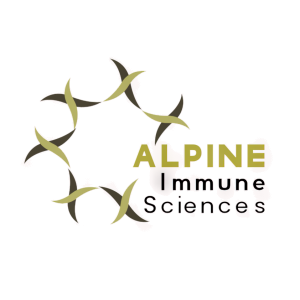Alpine Immune Sciences to Collaborate with Merck on Immuno-Oncology Study to Evaluate ALPN-202 in Combination with KEYTRUDA® (pembrolizumab)
Alpine Immune Sciences, Inc. (NASDAQ: ALPN), a leading clinical-stage immunotherapy company focused on developing innovative treatments for cancer and autoimmune/inflammatory diseases, announced today a clinical trial collaboration and supply agreement with Merck. This collaboration will evaluate the safety and efficacy of Alpine’s ALPN-202, a first-in-class conditional CD28 costimulator and dual checkpoint inhibitor, in combination with Merck’s anti-PD-1 therapy KEYTRUDA® (pembrolizumab), the first anti-PD-1 therapy approved in the United States. The clinical trial, NEON-2, began dosing study participants in June 2021.
“We are extremely pleased to collaborate with Merck, one of the world’s leading immuno-oncology companies,” said Stanford Peng, M.D., Ph.D., President and Head of R&D of Alpine. “Our prior preclinical studies demonstrated that the combination of ALPN-202 and a PD-1 inhibitor can be particularly advantageous, and this collaboration will greatly enable our ability to pursue this opportunity in the clinic. This study, in conjunction with NEON-1, ALPN-202’s ongoing first-in-human monotherapy trial, will provide insights across a broad spectrum of cancers and lines of therapy.”
KEYTRUDA® is a registered trademark of Merck Sharp & Dohme Corp., a subsidiary of Merck & Co., Inc., Kenilworth, NJ, USA.
About ALPN-202
ALPN-202 is a first-in-class, conditional CD28 costimulator and dual checkpoint inhibitor with the potential to improve upon the efficacy of combined checkpoint inhibition while limiting significant toxicities. Preclinical studies of ALPN-202 have successfully demonstrated superior efficacy in tumor models compared to checkpoint inhibition alone. NEON-1 (NCT04186637), a monotherapy study of ALPN-202 in patients with advanced malignancies, and NEON-2 (NCT04920383), a study of ALPN-202 in combination with KEYTRUDA® (pembrolizumab) in patients with advanced malignancies, are currently enrolling.
About Alpine Immune Sciences, Inc.
Alpine Immune Sciences, Inc. is committed to leading a new wave of immune therapeutics. With world-class research and development capabilities, a highly productive scientific platform, and a proven management team, Alpine is seeking to create first- or best-in-class multifunctional immunotherapies via unique protein engineering technologies to improve patients’ lives. Alpine has entered into strategic collaborations with leading global biopharmaceutical companies and has a diverse pipeline of clinical and preclinical candidates in development. For more information, visit www.alpineimmunesciences.com. Follow @AlpineImmuneSci on Twitter and LinkedIn.
Forward-Looking Statements
This release contains forward-looking statements within the meaning of Section 27A of the Securities Act of 1933, Section 21E of the Securities Exchange Act of 1934 and the Private Securities Litigation Reform Act of 1995. These forward-looking statements are not based on historical fact and include statements regarding our platform technology and potential therapies; the timing of and results from clinical trials and preclinical development activities; clinical and regulatory objectives and the timing thereof; the potential efficacy, safety profile, future development plans, addressable market, regulatory success, and commercial potential of our product candidates; the progress and potential of our other ongoing development programs; the efficacy of our clinical trial designs; anticipated enrollment in our clinical trials and the timing thereof; expectations regarding our ongoing collaborations; and our ability to successfully develop and achieve milestones in our development programs. Forward-looking statements generally include statements that are predictive in nature and depend upon or refer to future events or conditions and include words such as “may,” “will,” “should,” “would,” “expect,” “plan,” “intend,” and other similar expressions, among others. These forward-looking statements are based on current assumptions that involve risks, uncertainties, and other factors that may cause actual results, events, or developments to be materially different from those expressed or implied by such forward-looking statements. These risks and uncertainties, many of which are beyond our control, include, but are not limited to: the impact of the COVID-19 pandemic on our business, research and clinical development plans and timelines and results of operations, including the impact on our clinical trial sites, collaborators, and contractors who act for or on our behalf, may be more severe and prolonged than currently anticipated; clinical trials may not demonstrate safety and efficacy of any of our product candidates; our ongoing discovery and preclinical efforts may not yield additional product candidates; our discovery-stage and preclinical programs may not advance into the clinic or result in approved products; any of our product candidates may fail in development, may not receive required regulatory approvals, or may be delayed to a point where they are not commercially viable; we may not achieve additional milestones in our proprietary or partnered programs; the impact of competition; adverse conditions in the general domestic and global economic markets; as well as the other risks identified in our filings with the Securities and Exchange Commission. These forward-looking statements speak only as of the date hereof and we undertake no obligation to update forward-looking statements, and readers are cautioned not to place undue reliance on such forward-looking statements.
View source version on businesswire.com: https://www.businesswire.com/news/home/20210630005180/en/







